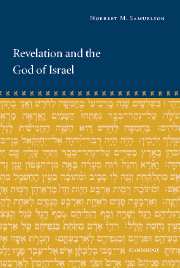3 - The God of the theologians
Published online by Cambridge University Press: 22 September 2009
Summary
THE DISCREDITATION OF RATIONALIST THEOLOGY
The primary goal of this book is analysis and critique of the concept of revelation, as a philosophic concept, out of the sources of rabbinic Judaism. Revelation is to be understood at its most general level as a relationship between humans, as the recipients, and God, as the transmitter, of revealed information. In the case of Judaism, where the humans involved are the Jewish people, the term applied to the information is “Torah.” Hence, the concept of revelation in Judaism builds on four other concepts – God, the human, the Jewish people, and the Torah. Of the four, my focus so far has been on the concept of God. The discussion has included the other three concepts as well, because they are all conceptually interrelated in Jewish belief, but the focus, at least for now, has been on the purported entity from which the revealed information originates. This kind of historically grounded, philosophic thinking about God is called “theology.”
MAIMONIDES AS THE BENCHMARK OF JEWISH THEOLOGY
Classical Jewish, rabbinic, philosophical theology does not end with Maimonides. On the contrary, the tradition continues, without disruption, to the present day, without any indication of an end. However, for present purposes, where the focus is on the notion of God as it relates to revelation, Jewish philosophy (perhaps even philosophy in general) reached its highest development with Maimonides. Others, such as Gersonides, will modify Maimonides' views.
- Type
- Chapter
- Information
- Revelation and the God of Israel , pp. 42 - 62Publisher: Cambridge University PressPrint publication year: 2002

